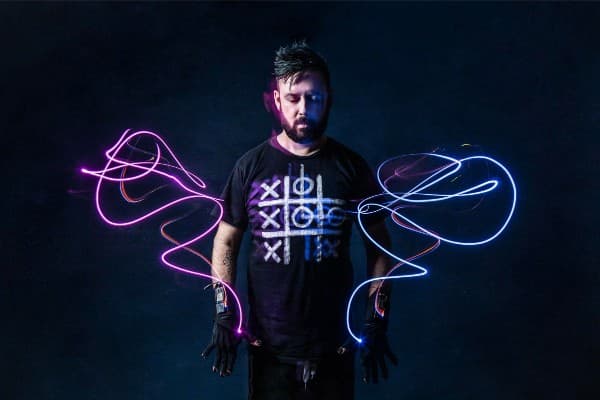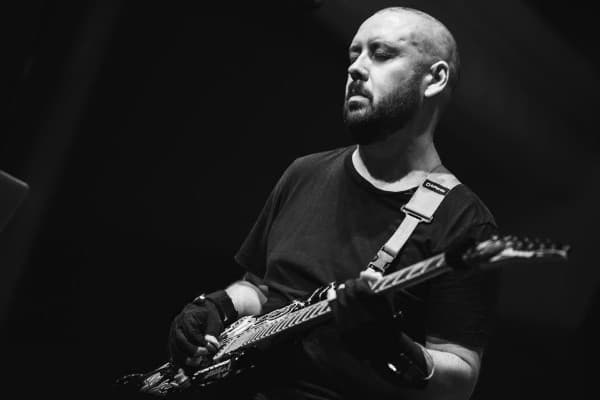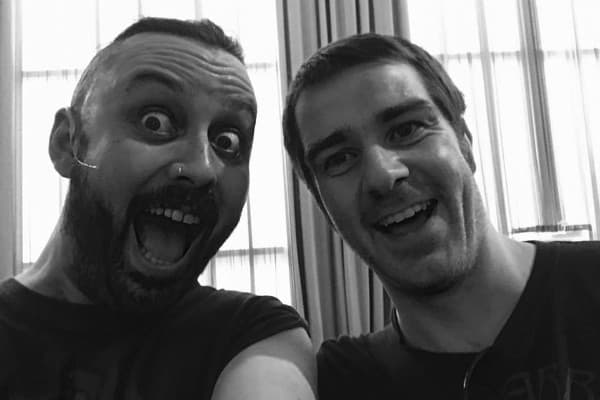Obviously, one of the important consequences of light audio recording is accessibility to creating music. Kris Halpin performs under the name Dyskinetic predominantly with the cyborg-witchcraft Mi.Mu gloves, and is a passionate advocate of accessibility to music creation, with a focus on disabled musicians.
Kris kindly took the time to answer some questions about accessibility to music, his work with Mi.Mu gloves, and other things I was curious about.
How many interviews have asked how long you’ve had CP?
Yeah, that’s always a bit weird.
It’s a lifelong condition by definition, but I guess people only know what they know, right? It does catch me off guard, but I try to remember that there’s plenty of stuff I don’t know about. I mean, there’s plenty of disability stuff I don’t know about!
So, yeah, deep breath. I don’t berate people. Hopefully.

Talk about how you first got into music: when you started playing, how that developed into composing, how that developed into producing, how producing developed into a career.
Well… my earliest memories are a lot of 80s pop from my mom, and more groggy stuff from my dad.
I loved Tears For Fears, and apparently Everybody Wants To Rule The World was my first favourite song. My dad gave me a cassette with most of Tubular Bells on one side and Vangelis’ China on the other.
From the age of about six, I would listen to that tape daily, really intently. I would try to visualize it, to try and understand what it made me “see” in my mind. Through that I came to understand the concept of parts and complexity in composition – there are some really intricate arrangements. I knew early on that – yeah, I could do that.
Production, recording, whatever… it was all just a necessary extension of capturing those ideas.
I had an Atari ST for my ninth birthday I think, and I already had a kind of toy synth – a Yamaha PSS-680. So that was my introduction to MIDI and the idea of recording stuff into a computer.
Obviously we were years away from recording audio into computers; I learned to record instruments on a Tascam Portastudio at school. No one else knew how to use it so I was allowed to take it home.
One thing that’s interesting for me in starting mucking about with this so young, is that I saw the whole DAW thing start from nothing; that very slow movement towards it being possible, but also not necessarily trusted.
I remember music mags at the time talking about the notion a recording music into a computer is being kind of gimmicky.
Of course, times changed, but I’m grateful to have that pre-DAW education. It taught me a lot, and I had to work hard for results, even crude ones.
A key aspect of light audio recording is accessibility to creating music – specifically considering money and space.
While the Mi.Mu gloves could definitely replace the need for bulky guitars and drums etc., and they’re coming on in leaps and bounds in terms of functionality e.g. emulating guitars, and they’re now publicly available, they still cost £2,500.
How long before they’ll check the box for affordability?
It’s interesting. I’d like to see them be more affordable of course, but I’d fly the flag for it being a pro instrument in an appropriate price bracket.
Early on the press was very focused on an idea that the gloves meant anyone could play them well – Buzzfeed notoriously went with the headline These Gloves Turn Anyone Into A Musician, which is really damaging and rubbish of course.
It’s a serious instrument, not a gimmick.
The reason I started playing them was because I could see scope for virtuosity, which I’d never seen in the realm of new instruments before. Most new instrument designs still rely on a binary event, you’ve either pressed the button or you haven’t.
The gloves required work, thought and skill, and – thankfully – you could get better at them.
But, yeah – a little cheaper would be great, when the time comes to do that right. Maybe the price of a good guitar? It’s a complex thing to make. There are ideas about how they could be cheaper, but technology would have to catch up a bit first.

Actually, how much gear does it take to make the Mi.Mu gloves function?
As I recall from your gig in Coventry, there was quite a bit, but I can’t remember if that was all essential essential, or what balance of that was to make the gloves work and how much was pro audio for the venue to hear it?
Like, do you need all that to make it work at home, or do you just need a laptop?
Just a Mac and router is all you need to make the gloves work.
All the other mucky muck is for everything else.
Early on I knew that the physicality of the performance meant I would need to be totally wireless, which meant using a headset mic, and an in-ear system. So before you know it you’re lugging a rack of gear.
Nowadays, I play guitar again with the gloves, so that’s even more gubbins.
After a lot of experimenting, I’ve managed to boil the guitar sound set up down to just one device, the Boss GT-1000. It sounds incredible, it has every effect I could want in it, and it’s roadworthy.
And thanks to great MIDI support, it plays nice with the gloves. That’s super important – I can’t operate pedals onstage due to my CP balance issues, so the GT-1000 is controlled via the gloves.
I know you use the Mi.Mu gloves with Ableton Live – do you know if they work with BandLab or Cakewalk, or is Ableton Live just your preferred DAW?
Everyone who plays gloves uses Ableton Live.
The gloves will happily work with any DAW, but the lesson here is that Live is sooooo easy and intuitive to make custom MIDI mapping controls, that it’s just faster than anything else.
MIDI Learn functions can be a real chore in most DAWs, but with Live the clue is in the name. It is designed for live performance.
But yeah, they’ll work with anything that understands MIDI.

As you demonstrate in your shows, the Mi.Mu gloves are a game changer for disabled musicians. Drake Music run workshops and further help accessibility to creating music for people with all kinds of disabilities.
These advances are focused on instruments and making sounds – do you think there’s space for pro audio brands and manufacturers to develop products that would help accessibility for disabled musicians, and can you give any examples?
e.g. manufacturers of audio interfaces, microphones, headphones, monitors etc… what can they do to make things better for musicians or producers with disabilities?
Yes! Totally, and we’re seeing some movement on that now.
My work has been a bit of an ‘in’ for brands. I’ve worked with a lot of tech companies to not only use their products in a new context, but feed back on their accessibility.
Drake Music is doing some really exciting work in this area, with major brands that you will know, too.
Am I at liberty to elaborate? No, I am not. But watch this space! Or rather, Drake Music’s space!
Off-the-shelf products being naturally inclusive would be the goal.
Drake Music’s CEO Carien Meijer said something really powerful recently; she said that in an ideal world we’d be out of a job, because we wouldn’t be necessary.
If music and the music industry actually included disabled people, there’d be no need for us. Of course, that’s not the case, nor is it likely to be anytime soon.
Do you ever get annoyed by the Mi.Mu gloves not quite nailing a sound that you know you could nail with a microphone and a physical instrument?
Ah, well I’m not sure I could anyway! My access to instruments is pretty limited. I literally only own guitars.
So I live in this weird space, where I may be sweating to create a realistic koto or dulcimer with gloves, but I don’t have the real thing available to me anyway.
Also, taking sounds into the physical space the gloves create is something new that a traditional instrument can’t have. It’s constrained by it’s own physics.
Playing familiar sounds in unfamiliar ways using the gloves can have a powerful effect on how we perceive sounds.
One example; I have this weird base bouncy ball affect, where it looks like I’m throwing the sounds around. When we came to prepare the new show, I started off, recreating the effects after having some time off. I imagined a sort of squelchy synth sound.
Then my assistant pulled up the old session and he was like “nah, is just a sampled P-bass.”
The sound had taken on this otherworldly quality due to the physicality of performing get gesture really with gloves. And that space of playing with sound and movement is incredibly exciting, and I’ve barely made a dent in it.

What aspects of light audio recording do you think could be improved in terms of accessibility to creating music, e.g. anything we could highlight more or better?
That could be in relation to disabled musicians, or anything else at all.
Well, I really love this idea and it inspired me to take a more basic approach to recording.
I’ve had access to decent studio for the best part of a decade, so to me the idea of using a laptop and a microphone at home is kind of a novelty, but a liberating one.
I’m in favour of anything that makes music making more democratic an inclusive.
When I talk about accessibility, it’s not just talking about access for disabled people. I’m talking about making the music-making event something that everyone this entitled to be part of.
iPhones democratized photography in away that made everyone feel entitled and confident to take photos. It was no longer the reserve of identity artists – the Photographer with a capital P. And yes there was no shortage of people getting angry about people posting pictures of their dinner on Instagram.
But the democratization of technology is way more interesting and important.
The concept of light audio recording could be a step in that direction to music making, and one I wholeheartedly endorse.
I started making my first recordings on a boombox with a microphone that I bought from Argos. What could be more accessible than that in 1992?
Music is a basic right, and no one should, in my view, see themselves as a “non-musician” – music is way too important.
If you found this helpful, subscribe on the right hand side of this page. You’ll be notified of new posts on Thursdays, inspiring you going into the weekend.
Share your own light audio recording thoughts and experiences! There’s a Facebook group, a Subreddit, Twitter and Instagram.
Meanwhile, over on Pinterest, you can find dedicated boards with pictures and links for the gear used in each session – essentially a buyer’s guide.
Also, on LinkedIn, you can see the business-brain of Light Audio Recording at work.
And finally, feel free to shoot me a coffee!
